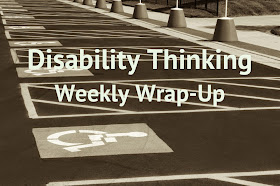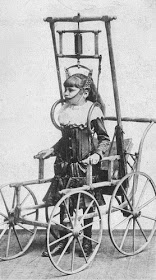I had some interesting Twitter conversations Wednesday afternoon, and more last night, in connection with a recent NPR story about
a family raising a son with severe disabilities. Emily Ladau of
Words I Wheel By had written a terrific blog post about it. Earlier the same day, I had also read a post about the same story, from a different perspective and drawing somewhat different conclusions, by Ellen Seidman of
Love That Max. Emily is a young woman who has lifelong physical disabilities. Ellen has a young son with cerebral palsy. I read both of their blogs regularly.
Both bloggers are compassionate, thoughtful, insightful, and fair-minded. Both have always demonstrated passion for their point of view, but also a willingness and ability to see things from other angles.
The main issue about the radio story, which pretty much everyone seems to have liked in general, was that the parents in the story allowed photos to be taken of their teenaged son, naked except for a "diaper", and that NPR posted them with the website transcript of the story. Several commenters to the online version of the piece were upset, feeling that the young disabled man's privacy and dignity had been compromised, without his consent, by his parents allowing him to be photographed, and by NPR for posting them.
Emily agrees in her blog post that this was problematic, and described how kids, in particular, who grow up with disabilities often have their privacy violated, usually without thinking, by well-meaning clinicians and even parents. She feels that parents have a responsibility to protect their kids' dignity, especially in news and social media, no matter what higher mission might be in play.
Ellen's piece discusses the importance of showing people what caring for a disabled child means, in very concrete terms. She cites some of the other commenters, parents of disabled kids, who lament the fact that people just don't understand what it's like for them. Although she doesn't draw a hard and fast conclusion, Ellen seems to imply that the value of public exposure may, at times, outweigh the potential negatives.
I generally agree more with Emily's take, though I don't think Ellen is entirely wrong, either. I also sense that there is some misunderstanding of what some folks objected to. It isn't about body shame or wanting to hide difficult realities, it's about privacy, consent, and the duty of others to protect people who may not be able to give meaningful consent.
This brought up another thought that I have had before, but found it hard to describe. I think that there are some very significant ... and very natural ... differences, divides, and even conflicts between how parents of kids with disabilities think about disability, and how kids and former kids with disabilities think about it.
For instance, parents seem to feel that people don’t understand what they are going through raising disabled children. They seem to be hungry … not so much for sympathy, but for acknowledgement. There is a feeling that everyone's attention is focused on disabled children, and that their parents are too often forgotten and discounted.
On the other hand, disabled kids, and especially adults who had disabilities as children, look at the same situation and feel that parents get all the focus, have the biggest voices, and define the image and meaning of disabled children to the public. Since I am one of them, I’ll go ahead and say that “we” often feel like we are the forgotten ones, that our perspective is left out of our own stories about childhood disability. It’s not just that people choose the parents’ perspective over ours. It’s that they sometimes forget that we even have a perspective.
In a sense, parents of kids with disabilities, and kids with disabilities themselves, are competing for attention and a voice. Only it’s more complicated even than that. Often, it’s adults with disabilities who compete to be proxy voices for disabled kids who haven’t developed voices of their own. We bring our own experiences with us to these discussions, and often view parents of disabled kids with empathy, but also caution. Our experience lends us some credibility, but our “baggage” sometimes causes us to grind personal axes instead of looking clearly at how things really are.
I’m not sure what parents of disabled kids think, broadly, about disabled adults. Occasionally I have read hints that they feel we are claiming a role that isn't properly ours. Also, that the more articulate and organized among us don't understand how our ideas of freedom and agency miss the mark with children who have very significant physical and cognitive disabilities. That seems like fruitful ground for honest debate.
A couple of months ago a parent blogger and I did a
joint blog post in which she asked me questions and I provided my answers about growing up with disabilities. I would love to see that kind of exchange happen more often, where parents of kids with disabilities, youth with disabilities, and adults who grew up with disabilities could discuss and debate our different perspectives on things like education, inclusion, therapies, caregiving, future planning, and scores of other issues we all face, together.
Maybe a Blog Hop or Link-Up? What do you think?
=====
Addendum:
For what it's worth, I have had phases in my life when I was looked at from top to bottom by all sorts of medical professionals. It did bother me a bit. Not because of any shame or embarrassment about my body, but because I would occasionally feel like I was being treated as a curiosity or, quite literally, as a learning tool for interns and student nurses. There's a use for that, but it always felt much better when the people looking would ask, nicely and respectfully, if I minded.
In this case of the Lees and this article, I am willing to concede that Justin Lee probably isn't aware of his photo being publicized. However, if that's so, then I think it only makes it more important for people who know him to be extra cautious about exposing him to the public. And I think that the descriptions in the story were more than enough to make people understand the situation, without the need for photos.






















